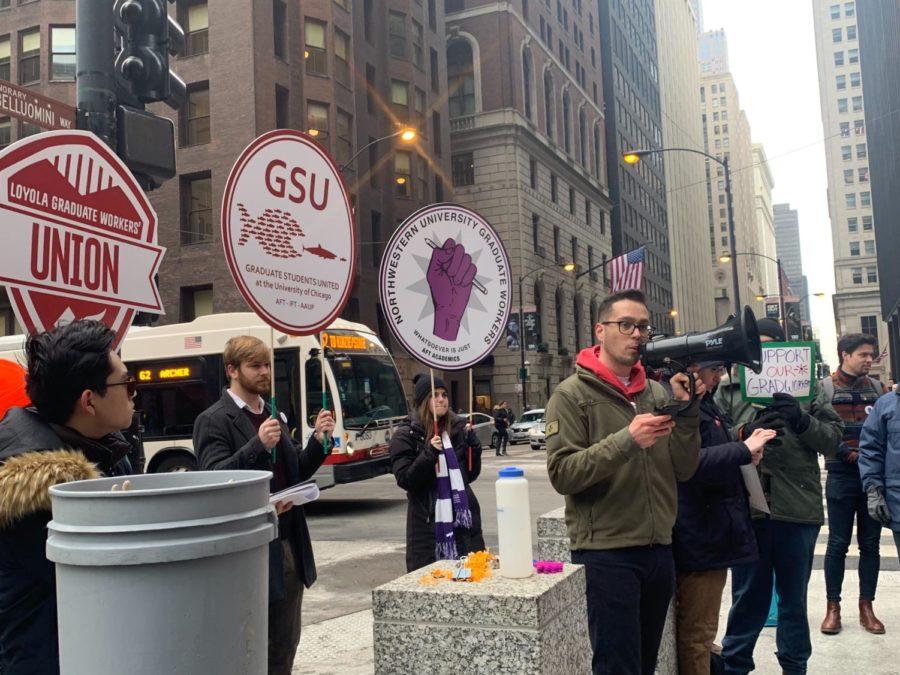Graduate Students United (GSU) members have vowed to continue withholding payment of the University’s graduate student services fee indefinitely amid a mobilization of faculty support. The campaign began in February and was prompted, GSU members wrote in their pledge, by the financial hardships of the COVID-19 pandemic, a reduction in in-person services provided by the University, and incomplete information on how the University uses money from the fee.
Graduate students in the Biological Sciences Division (BSD) were told last month that continuing to withhold payment would result in a loss of building access, though the University has yet to follow through on that warning.
In a screenshot of an email delivered on May 10 that was shared with The Maroon, BSD associate dean Diane Hall wrote to graduate students who had not paid the fee that failure to do so by the following day would result in a loss of key card access to the division’s buildings.
Hall declined a request for comment.
According to representatives from GSU, the University has so far not restricted building access for any of its members in the BSD. Doing so, they wrote in a statement to The Maroon, would be a “severe retaliatory action on the part of the University for a political action that directly inhibits both the welfare of research animals and the ability of BSD students to do their time-sensitive work.”
Gerald McSwiggan, the University’s assistant director for public affairs, wrote in a statement to The Maroon that “select administrative units and area deans of students have discretion to apply restrictions to students’ accounts and privileges when students are in violation of University policy. Penalties may include building access restrictions.” He added that “the University adheres to all applicable federal, state, local and institutional laws or guidelines governing animal research.”
The absence of a more significant University response is a small but meaningful win for GSU, GSU co-president Michael Stablein Jr. said.
“A chief victory would be the administration making any kind of attempt to speak directly with us,” he said. “That would be a real win. That being said, frankly, without sizable retaliation by the administration, we really see it as a normalization of non-payment for a fee that, frankly, has never been fully explained or defended in any kind of tangible way.”
Though the campaign was originally prompted by financial strains and reduced access to in-person services brought on by the COVID-19 pandemic, Stablein said that GSU plans to continue its campaign even amid falling COVID-19 cases, the rollout of vaccines, and a return to in-person instruction in the fall.
“We plan on continuing indefinitely,” he said, underscoring GSU’s call for the University to refund any payments of the graduate student services fee that have already been made.
According to the University’s website, the graduate student services fee “covers many services dedicated to enhancing the quality of student services and campus activities, and is used to provide and promote educational, social, cultural, and recreational programs and services for all students throughout the year.” Payment of the spring quarter fee was due on February 3, and nearly 500 graduate students are refusing to pay.
The website also states that “[t]he Student Services Fee will be waived only for those students who live and study over 50 miles from campus and who will not be on campus during the academic year. Students need to petition Campus and Student Life to receive this waiver. There are no other grounds for waiving this mandatory fee.”
On May 11, 13 directors of graduate studies signed a letter written by English Department Director of Graduate Studies Mark Miller to Dean of Students Michelle Rasmussen calling on the University to honor GSU’s request to waive or reduce the student services fee of $416 per quarter.
“I understand one of my main jobs to be supporting our graduate students, and in this issue in particular, that means trying to make their concerns apparent and clear to the people who are in a position to do something about them,” Miller told The Maroon. “It's a paternalistic argument to say, ‘We take such good care of them; therefore, we shouldn't listen to their desire to be treated as adults.’”
On May 20, Miller and a group of other faculty members met virtually with Rasmussen and Vice Provost Jason Merchant in order to express their concerns over the fee. According to Miller, they were told that while the University would not universally waive the fee, graduate students can petition the deans of their respective divisions to cover the fee using their own budgets.
Stablein told The Maroon that GSU will not be taking this approach, citing unequal funding across divisions.
“I can say pretty confidently that we have no interest in moving [in] that direction,” he said, stressing a desire to avoid a situation in which “members are successful in one division and not another, leaving some pledged withholders while others are sort of relieved.”









